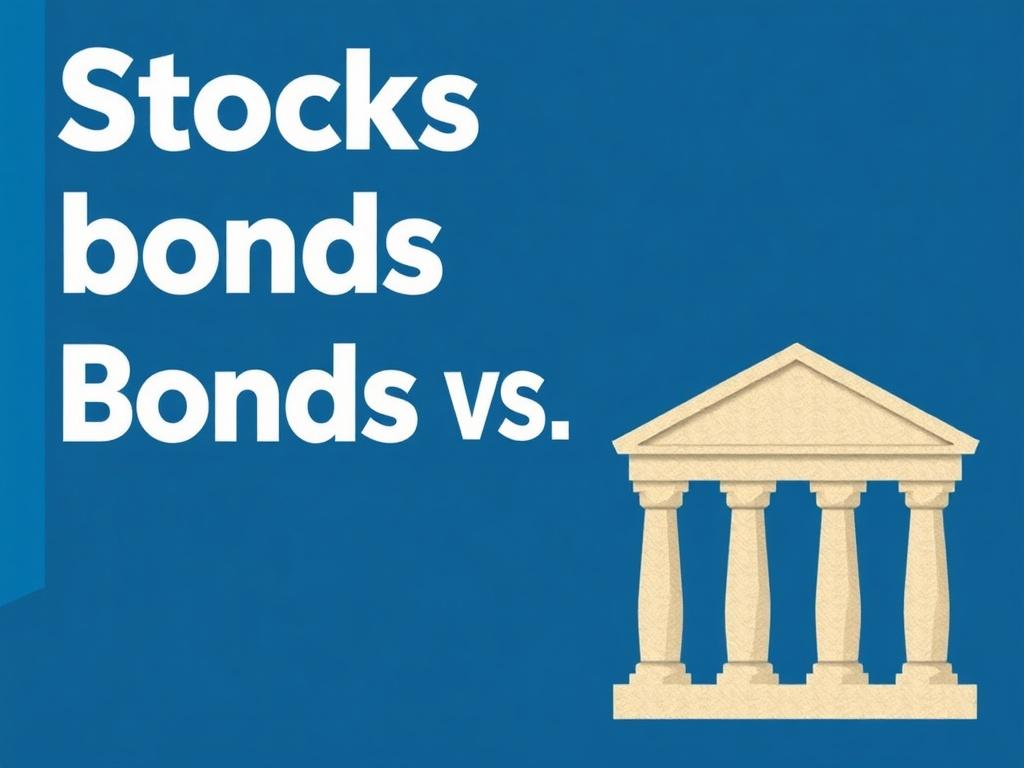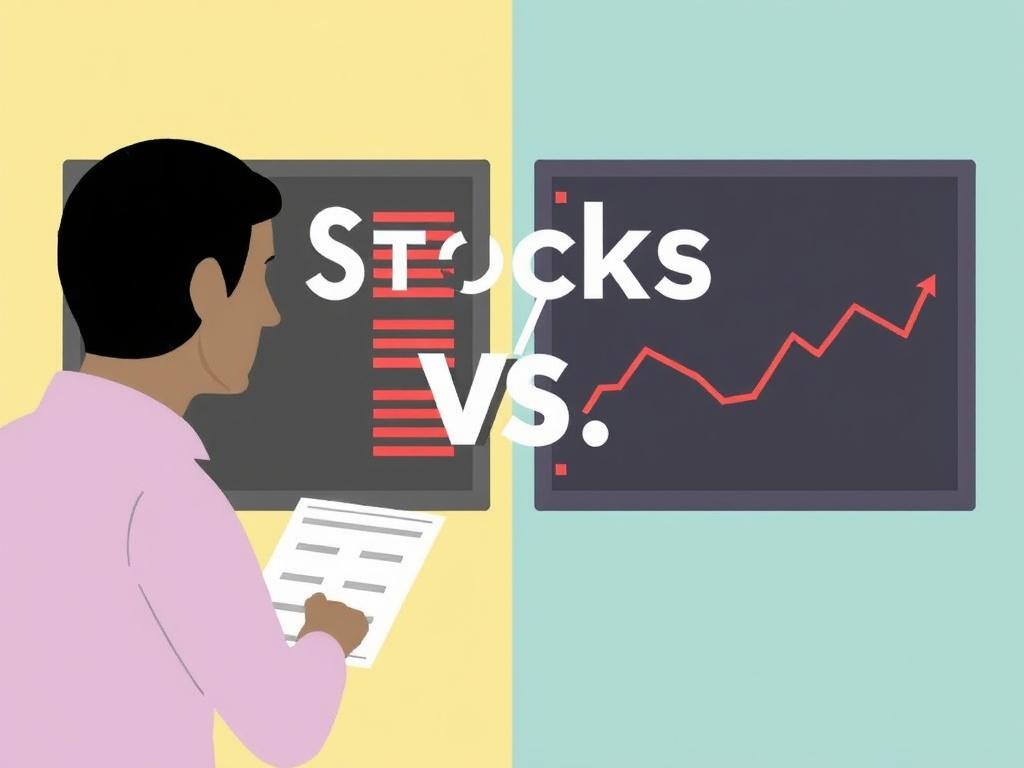SQLITE NOT INSTALLED
Investing can seem like a daunting world filled with complex jargon and confusing choices, especially for beginners. Two of the most common and widely discussed investment options are stocks and bonds. When you’re just starting out, figuring out the differences between these two, understanding their risks, rewards, and how they fit into your financial goals can feel overwhelming. So, which is better for beginners: stocks or bonds? This article will guide you through the basics, the advantages and disadvantages of each, and help you decide which investment might be the best fit for your situation.
Содержание
What Are Stocks?

Stocks represent ownership in a company. When you buy a stock, you’re essentially purchasing a small piece of that company. Stocks are often called “equities,” and owning them means you share in the company’s profits through dividends or capital appreciation if the stock price increases. Stocks are traded on stock exchanges, and their prices fluctuate based on company performance, market conditions, and investor sentiment.
For beginners, stocks can be exciting because they offer the potential for high returns. However, with higher returns comes higher risk. Stock prices can be quite volatile, meaning they can rise or fall sharply in a short period. This variability can be stressful for new investors who are not prepared for market swings.
Types of Stocks
There are different types of stocks you might encounter, including:
- Common Stocks: Most investors buy these. They come with voting rights and may pay dividends.
- Preferred Stocks: These usually don’t provide voting rights but have priority over common stocks when it comes to dividend payments.
- Growth Stocks: Companies expected to grow faster than the market average, often reinvesting earnings rather than paying dividends.
- Dividend Stocks: Established companies that pay regular dividends and provide steady income.
This diversity allows investors to tailor their stock portfolio according to their goals and risk tolerance.
What Are Bonds?

Bonds, on the other hand, are essentially loans you give to governments, municipalities, or corporations. When you buy a bond, you’re lending money to the issuer in exchange for regular interest payments and the return of the bond’s face value when it matures. Bonds are often considered safer investments than stocks because they provide fixed income and have set maturity dates.
For beginners, bonds can be appealing because they tend to be less risky and help balance the volatility of stocks in a portfolio. However, bonds generally offer lower returns compared to stocks over the long term. Understanding this trade-off is crucial when deciding how much of your money should go into bonds versus stocks.
Types of Bonds
Bonds come in various forms, including:
- Government Bonds: Issued by national governments, such as U.S. Treasury bonds, considered very safe.
- Municipal Bonds: Issued by states or cities, often tax-exempt at the federal level.
- Corporate Bonds: Issued by companies, typically offering higher interest rates but with greater risk than government bonds.
- High-Yield Bonds: Also called “junk bonds,” these offer higher returns but come with higher risk.
Risk and Reward: A Balanced Perspective
Understanding the risk and reward associated with stocks and bonds is crucial. Stocks usually offer higher potential returns but come with greater risk of losing money. Bonds offer more stability and steady income but generally provide lower long-term returns.
To help illustrate this, let’s compare the typical characteristics of stocks vs. bonds in a table:
| Aspect | Stocks | Bonds |
|---|---|---|
| Ownership | Partial ownership in a company | Creditor lending money to issuer |
| Risk Level | Higher volatility and risk | Lower risk, more stable |
| Return Potential | Higher, variable | Lower, steady interest payments |
| Income | Possible dividends (not guaranteed) | Regular interest payments |
| Investment Horizon | Better suited for long term | Can be short to intermediate term |
The Role of Time and Market Cycles
When comparing stocks vs. bonds for beginners, it’s important to consider how time affects each. Historically, stocks have outperformed bonds over the long term, making them attractive for younger investors with years to ride out market fluctuations. Bonds tend to shine during uncertain periods or closer to retirement when preserving capital matters more.
Why Beginners May Prefer Stocks
Many first-time investors naturally gravitate towards stocks because of their growth potential and the excitement of the stock market. Stocks can build wealth over time, especially when invested in quality companies or diversified through mutual funds or ETFs (exchange-traded funds).
Here are some reasons stocks might be better for beginners who want growth:
- Compound Growth: Stocks offer the chance to benefit from compounding returns over years or decades.
- Accessibility: With today’s apps, buying and selling stocks is easy and often low-cost.
- Diversification Opportunities: Broad market index funds provide exposure to many companies, reducing risk.
- Higher Returns Over Time: Historically, stocks have returned around 7-10% annually.
However, beginners must be prepared for market ups and downs and avoid panic-selling when prices drop.
Why Bonds Might Be Better for Some Beginners
If you’re risk-averse or need more predictable income, bonds might feel safer. Bonds provide steady interest payments and generally fluctuate less in price than stocks. For those closer to retirement or with short-term goals, bonds offer stability and capital preservation.
Here’s why bonds may appeal to certain beginners:
- Lower Volatility: Less price fluctuation helps protect your investment.
- Income Generation: Regular interest payments provide cash flow.
- Capital Preservation: You usually get your principal back at maturity.
- Suitable for Short-term Goals: Bonds fit better if you need money in a few years.
However, the downside is limited growth potential and the risk of inflation eroding the bond’s purchasing power.
What’s the Best Mix? Stocks vs. Bonds in a Beginner’s Portfolio
Most financial experts recommend beginners build a diversified portfolio containing both stocks and bonds. The mix depends on your age, risk tolerance, and financial goals. One common rule of thumb is to subtract your age from 100 or 110 to determine the percentage of your portfolio that should be in stocks, with the rest in bonds.
For example, if you’re 30 years old:
– Stock allocation: 70-80%
– Bond allocation: 20-30%
This balance allows you to benefit from growth while reducing risk through bonds.
Sample Portfolio Allocations
| Investor Age | Stock Allocation | Bond Allocation | Risk Level |
|---|---|---|---|
| 20 | 90% | 10% | High |
| 40 | 70% | 30% | Moderate |
| 60 | 40% | 60% | Low |
| 75 | 20% | 80% | Very Low |
How to Get Started with Stocks and Bonds

For beginners, the first step is opening an investment account, either a brokerage or a tax advantaged account like an IRA. Next, consider these tips:
- Start Small: You don’t need a lot of money to begin investing. Many platforms allow fractional shares.
- Educate Yourself: Use resources like books, online courses, and financial advisors.
- Diversify: Avoid putting all your money into one stock or bond.
- Consider Mutual Funds or ETFs: These bundle many stocks or bonds into one product, reducing risk.
- Stick to Your Plan: Don’t react emotionally to market changes.
Costs to Be Aware Of
Investing isn’t free. Pay attention to:
- Brokerage Fees: Many providers now offer commission-free trades, but always check.
- Expense Ratios: Mutual funds and ETFs charge management fees, which can affect returns.
- Tax Implications: Dividends and interest may be taxed, so consider tax-efficient accounts.
Common Beginner Mistakes in Stocks and Bonds
Learning from common pitfalls can save you money and stress.
- Trying to Time the Market: Predicting market ups and downs rarely works out.
- Lack of Diversification: Putting all your eggs in one basket increases risk.
- Ignoring Risk Tolerance: Investing in assets too volatile for your comfort leads to panic selling.
- Overemphasizing Past Performance: What worked yesterday might not work tomorrow.
- Neglecting Bonds: Some beginners focus solely on stocks and ignore the stabilizing role bonds play.
Final Thoughts on Stocks vs. Bonds for Beginners
Choosing between stocks and bonds is not a strict either-or decision, especially for those just starting. Stocks tend to offer greater long-term growth potential but come with more risk and volatility. Bonds provide stability and income but usually with lower returns. For beginners, understanding these differences, and how they align with your personal financial goals, investment horizon, and risk tolerance is key. Most first-time investors benefit from a balanced approach that combines both stocks and bonds, gradually adjusting the mix as life circumstances change.
Summary Table: Stocks vs. Bonds for Beginners
| Feature | Stocks | Bonds | Best For |
|---|---|---|---|
| Investment Goal | Growth, wealth building | Income, capital preservation | Long-term growth / Shorter-term stability |
| Risk | High | Lower | Younger / Higher risk tolerance / Older / Risk averse |
| Volatility | High | Low | Prepared for ups and downs / Prefer stability |
| Income | Variable dividends | Fixed interest payments | Income investors |
Conclusion
At the end of the day, whether stocks or bonds are better for beginners depends on individual objectives and comfort with risk. Stocks offer exciting opportunities for growth but demand patience and a tolerance for market fluctuations, while bonds provide a safer, steadier path that can preserve capital and generate income. For most beginners, a blend of both – thoughtfully balanced to match financial goals and timelines – tends to be the most effective way to navigate the world of investing. Starting early, staying informed, and building a diversified portfolio with both stocks and bonds can set the foundation for long-term financial success.
Опубликовано: 23 July 2025 Кредитрон – блог о кредитах, финансах и прочих реверансах
Кредитрон – блог о кредитах, финансах и прочих реверансах

